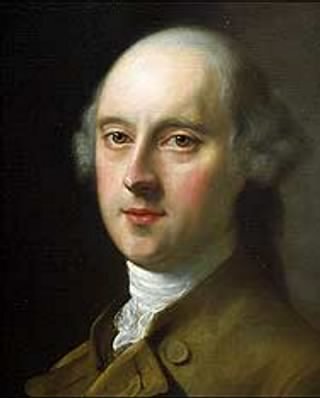
Richard Stockton
New Jersey
A man’s character, a man’s spirit is viewed in stark relief when threats are applied to one’s reputation, riches, and/or existence in service to others. Often, a man with great abundance of either of these three realities clutches to them and refuses sacrifice for the sake of others. History tells us Richard Stockton was not of the ilk of those who cower when great loss is eminent. He exemplified great humility for the creation of a new country for the benefit of his fellow man.
Richard Stockton was born on October 1, 1730 to John and Abigail Stockton near Princeton, New Jersey. He was the eldest of eight children. His early education was conducted by Rev. Samuel Findley at Nottingham Academy in Maryland. He attended and graduated from the College of New Jersey in Newark in 1748. The college moved to Princeton eight years later. After college, he focused on the study of the law under the guiding hand of the honorable David Ogden, the most reputed lawyer in the colony.
In 1754, Mr. Stockton opened his own law office, and later began another in Newark. In 1763, he received the highest degree of law available, the Sergeant-at-Law. He was considered one of the most eloquent counsels in America.
Three years later, Richard Stockton embarked on a 15-month tour of the British lands: England, Scotland, and Ireland. He was quite popular as his handsomeness and etiquette drew people to him. One person remarked, “I like Mr. Stockton exceedingly. He is certainly the cleverest man I have yet seen from America.” While attending the Queen’s birthday ball, he was presented to King George III, and later had the honor of addressing the king. His address was an acknowledgement of the repeal of the Stamp Act. The king being impressed with Mr. Stockton gave him a coat of arms and motto: Monia Deo Pendent—all depends on God.
While in Scotland, Richard Stockton visited Rev. John Witherspoon, a minister in Paisley. Dr. Witherspoon had been approached to be president of the College of New Jersey and had declined. Benjamin Rush, at the time he was enrolled in medical school in Edinburgh, joined Mr. Stockton in striving to persuade Rev. Witherspoon to reconsider. After discussion and after his objections had been removed, Rev. Witherspoon finally accepted the invitation to be the college’s next president. The college flourished under his leadership from 1768-94.
Richard Stockton’s leadership steadily rose after his return from Great Britain. In 1768, he was appointed to the royal executive council of New Jersey. Shortly thereafter, in 1774, he was selected to be a judge on the province’s supreme court. In this position, he created a proposal for Lord Dartmouth, Secretary for the Colonies, outlining a resolution to the disputes the colonies had with the crown. The proposal outlined a structure for self-governance independent of Parliament’s authority or oversight, but with complete allegiance to King George III. He warned, “If something of the kind was not done, he warned Lord Dartmouth, the result would be an obstinate, awful, and tremendous war.”
The proposal was rejected and war came. Richard Stockton was pushed to choose between his loyalty to the crown and his affection for the colonies. He sided with his fellow colonists. He resigned from all royal appointments and was selected as a delegate to the Second Continental Congress. He and fellow delegate, John Witherspoon, rode from Princeton to Philadelphia through a violent thunderstorm and traversed muddy roads and trails. Arriving wet and weary, they entered the state house (now Independence Hall) as John Adams was nearing the end of his address.
Richard Stockton asked Mr. Adams to present his speech again from the beginning. Mr. Adams balked at the request. Mr. Stockton repeated his request and Edward Rutledge urged him to oblige saying, “only Adams has the facts at his command.” John Adams stood up and re-presented the reasons to break away from England. The debate continued after his speech. Positions for and against independence were exchanged. At the end of debate, Mr. Stockton addressed the body with his support of Richard Henry Lee’s resolution for independence. He would later call John Adams “the Atlas of the hour, the man to whom the country is most indebted for the great measure of independency.”
In the fall of the year of independence, Richard Stockton and fellow signer of the Declaration, George Clymer, set out on an assignment to evaluate the state of the northern portion of the Continental Army. They had the authority to secure provisions and provide shelter. They also reported back to the Congress on what they observed. In a letter written to fellow signer Abraham Clark, Mr. Stockton explained the dire situation.
“… a great part of the men barefooted and barelegged. My heart melts with compassion for my brave countrymen who are thus venturing their lives in the public service and yet so distressed. There is not a single shoe or stocking to be had in this part of the world, or I would ride a hundred miles thought the woods, and purchase them with my own money—for you’ll consider that the weather here must be different from that in New Jersey; it is very cold now I assure you. For God’s sake my dear sir, upon the receipt of this collect all the shoes and stockings you can, and send them off for Albany in light wagons …”
When the British invaded New Jersey, Richard Stockton rushed home and moved his family to a presumed, safer location. On November 30, 1776, loyalists dragged him out of bed and marched him through the cold night dressed only in a nightshirt and breeches. The British held him until General George Washington petitioned General William Howe. In mid-January, Mr. Stockton was given parole under the condition he would not participate in the war effort in any manner. His condition was critical by the time he returned to his home.
Because he could no longer serve the Congress or the army, Mr. Stockton resigned from Congress. He spent almost two years resting and regaining his strength. Once well enough, he began practicing law again. Eventually, he developed cancer and passed away on February 28, 1781. The man who sacrificed greatly to ensure independence never saw the final victory to secure it.
At his interment, Rev. Samuel S. Smith, spoke of his Christian faith in this manner: “As a Christian, you know that, many years a member of this church, he was not ashamed of the gospel of Christ. Nor could the ridicule of licentious wits, nor the example of vice in power, tempt him to disguise the profession of it, or to decline from the practice of its virtues. … For nearly two years he bore with the utmost constancy and patience, a disorder that makes us tremble only to think of it. With most exquisite pain it preyed upon him, until it reached the passages by which life is sustained: yet, in the midst of as much as human nature could endure, he always discovered a submission to the will of heaven, and a resignation to his fate, that could only flow from the expectation of a better life.”

